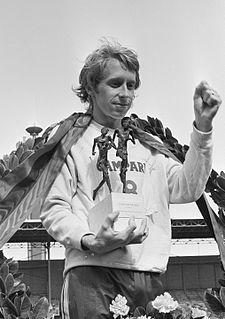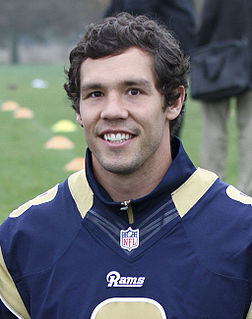A Quote by Tom Hodgkinson
I've never understood activity holidays since we seem to have far too much activity in our daily lives as it is. Find a culture where loafing is the order of the day and where they don't understand our need to be constantly doing things. Find somewhere you can have a hammock holiday.
Related Quotes
The world is full of men and women who work too much, sleep too little, hardly ever exercise, eat poorly, and are always struggling or failing to find adequate time with their families. We are in a perpetual hurry-constantly rushing from one activity to another, with little understanding of where all this activity is leading us. . . . The world has gone and got itself in an awful rush, to whose benefit I do not know. We are too busy for our own good. We need to slow down. Our lifestyles are destroying us. The worst part is, we are rushing east in search of a sunset.
Meditation is making research into yourself, and into the subtler fields of activity. Day after day we culture our minds with the deep silence of our own Being. This is not the silence of a stone, but creative silence. We have to find it for ourselves. We decrease activity until silence becomes creative, and we sit in creative silence and close the gates of perception for insight into the content of life.
Running is a very natural activity. If you get too caught up, you find yourself constantly seeking to make running something that it isn't. You should let it be what it is - a very simple activity. Running has become too complicated for many people and they wind up turning sour on the sport, or losing the focus of their direction.
I played a million different sports when I was growing up. I started when I was probably five or six, and we'd just go from activity to activity to activity. I think, finally, my parents just realized that we were missing something in our lives. They realized that it was time for us as a family to start going to church.
I chose Congo in order to become close to a place that we had turned away from. It isn't present in our imaginations, in the stories we tell each other. Yet it's relevant to our lives and to our worlds, in a practical way. Congo supplies raw materials for the things that we use on a daily basis. We are intimately linked to Congo, economically. We're linked to it through human events that are occurring there, that affect all of us, and yet you don't find narratives of Congo present in our lives.
Philosophy is a necessary activity because we, all of us, take a great number of things for granted, and many of these assumptions are of a philosophical character; we act on them in private life, in politics, in our work, and in every other sphere of our lives -- but while some of these assumptions are no doubt true, it is likely, that more are false and some are harmful. So the critical examination of our presuppositions -- which is a philosophical activity -- is morally as well as intellectually important.
There are moments in our lives, there are moments in a day, when we seem to see beyond the usual- become clairvoyant. We reach then into reality. Such are the moments of our greatest happiness. Such are the moments of our greatest wisdom. It is in the nature of all people to have these experiences; but in our time and under the conditions of our lives, it is only a rare few who are able to continue in the experience and find expression for it.
We become so caught up in the busyness of our lives. Were we to step back, however, and take a good look at what we’re doing, we may find that we have immersed ourselves in the “thick of thin things.” In other words, too often we spend most of our time taking care of the things which do not really matter much at all in the grand scheme of things, neglecting those more important causes.
Another activity that can detract us from the proper way is watching television excessively or viewing improper movies. While fine productions on these media are uplifting and entertaining, we need to be very selective in choosing what we see and how much of our time such an activity deserves. Our precious time must not be diverted to the sideline attractions of vulgar language, immoral conduct, pornography, and violence.
Imagination is strong in a man when that particular function of the brain which enables him to observe is roused to activity without any necessary excitement of the sense. Accordingly, we find that imagination is active just in proportion as our sense are not excited by external objects. A long period of solitude, whether in prison or in a sick room; quiet, twilight, darkness-these are the things that promote its activity; and under their influence it comes into play of itself.






































